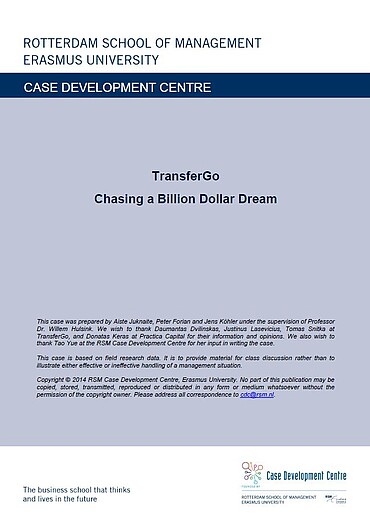Citation Note
Based on field research; 14 pages.
Follow the 'handle' link to access the Case Study on RePub.
For EUR staff members: the Teaching Note is available on request, you can contact us at rsm.nl/cdc/contact/
For external users: follow the link to purchase the Case Study and the Teaching Note.
Objective
Learning objectives: The case serves as a prime example of a successful online company following the principles of lean entrepreneurship. It is designed for students to learn about different aspect of international entrepreneurship and allow them to apply entrepreneurial and strategic frameworks themselves. The case has three main teaching objectives: 1. (Understand) After discussing this case, students will be able to explain the key characteristics and importance of lean entrepreneurship applied to the context of an international new venture. 2. (Analyse/apply) Students will be able to compare and choose between either a high growth based or a revenue based approach to internationalization strategy. 3. (Create) Students will be able to create and defend their approach to internationalization strategy in order to pursue venture capitalist funding.
description
After TransferGo – an online money transfer platform – has made its mark in nearly every European country, it decides to take the leap outside of Europe. It cannot decide, however, whether to take the risk and expand radically or be conservative and expand incrementally.
Abstract
TransferGo is a company handling online money transfers founded by two Lithuanian young men in the U.K. in September 2012. Within the first two years of its existence, TransferGo made its mark in nearly every European country. In 2014 the founders felt that the time was right to take the leap outside of Europe. They were, however, divided between two fundamentally different approaches towards internationalisation strategy: the incremental revenue-based approach or the radical growth-based approach. Capital from the previous funding round was running low, so a choice had to be made. Should TransferGo take the risk and follow the radical approach, reinforce the team and attract major venture capital in order to grow its business quickly? Or should it follow an incremental revenue-based approach that involves less risk and slower changes? Apart from the discussion around incremental revenue-based internationalisation versus the radical growth-based internationalisation approach, the case also fosters students’ understanding of key characteristics and the importance of lean entrepreneurship in the context of an online start-up. Furthermore, it strives to develop both hard and soft skills by letting students create their own business plan and pitch it to the lecturer as well as their peers.
